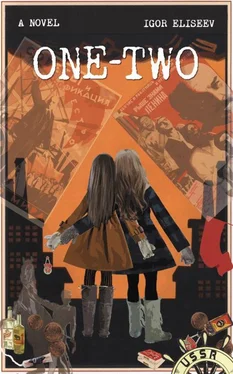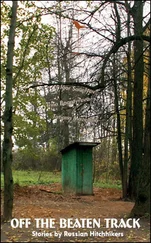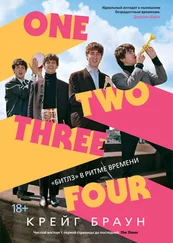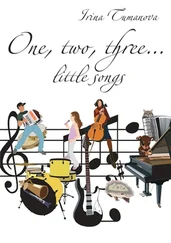“Yeah,” you agreed. “Enough’s enough. Come on; let’s look for a toilet and a wash basin.”
Having left the bedroom, we resumed exploring the house in the light of day. Our attention was drawn to a long corridor connecting the entrance door and other rooms. We could see colored, handmade, patchwork carpets, and beyond, walls covered with yellowish patterned wallpaper interspersed with newspapers hanging like unkempt rags. Behind the middle door on the left we found a spacious drawing room. There was an old sideboard, a rocking chair, a chest, a dresser with a small radio, and a couch. The most memorable items were an abundance of black-and-white photos on the walls and a big cuckoo clock. The only door on the opposite side led to a lavatory attached to a hen house. The most astonishing discovery was the total absence of mirrors, even small ones. We couldn’t find any, neither in the bedroom, nor in the bathroom, as if a newly deceased person were in the house.
The kitchen table was laid with bread and boiled potatoes, over which was sprinkled fresh dill; the landlady appeared to have gone out. Confused, we also went out, into the yard where we found our blanket drying on a rope together with other laundry. The old lady, holding two wooden billets in her hands, came out of the shed towards us.
“Have you had your breakfast? I left some food for you.”
“We didn’t know if it was made for us,” I answered.
The old woman looked us over from head to foot again; her gaze gave me that familiar, uncomfortable feeling. Some people’s appearances make good impressions on others, but not ours; we have always felt uncomfortable and guilty.
“Here’s what,” you said, breezily, “we need to make our way to the nearest town.”
“You’re so thin,” the old woman observed, nodding the while and then shaking her head. “Have you got any money? Let’s go into the house first and you will tell me your story,” she offered.
Having seated us at the table, Rosa Ivanovna – that was the old woman’s name – started firing up a samovar, darkened with soot. She poured tea into three large cups, sat down opposite us and started talking again.
“What are your names, sweethearts?”
“I’m Faith and she is Hope,” I said with a tone of pride, believing in the great importance of our names.
“Good ones,” she nodded slightly.
And only here, in the kitchen, eating fresh bread with boiled potatoes, I finally realized: our old life with the humiliating nicknames had come to an end. We had abandoned it forever, left it in the foster home, exchanged it for an old blanket and our freedom. Caught up in these thoughts, I started examining Rosa Ivanovna and by chance noticed that her teeth were disproportionately big and made of iron. I guess my surprise was unwittingly expressed on my face because the landlady started laughing quietly:
“Don’t make that face, honey; they really are iron. On the other hand, they’re so hard that I could crack nuts with them. I lost my own long ago. Well, eat. Don’t be shy. I know all about hunger.”
“Did you live in an orphanage?” I asked naively.
“No, why would you think that? I have been in a great variety of places throughout my life, but I never happened to live in an orphanage. I grew up in a normal family; my best memories go back to those days. I went to school with a black, leather schoolbag; I would never forget that bag. My dad made it for me. He was a shoemaker and crafted boots for the entire town. Mummy was teaching music at a school. She played the violin and taught me how to tweedle, too. I can’t express what a beauty she was. As soon as she went out of the house, all the men around her fainted with delight.” At first she spoke rather incoherently. Her mind seemed to be wandering, but gradually she organized her thoughts and went on: “My childhood was everyone’s envy in every respect, if you understand what I mean. No one could foresee what I would go through later on.”
“And what did you go through?” You had stopped chewing and you asked her, direct.
“The War (This refers to World War II (lasting from September 1, 1939 till September 2, 1945), the war between the two global military and political coalitions which became the largest armed conflict in the history of mankind),” the old woman said in a shattered voice. “The Germans came and occupied the city, seized power; our house was turned into a heap of ruins. Everything dear to me was wiped out in a moment. Hunger overcame the whole country; people grew blind from crying, weakened by pain and despair; children were dying in bunches. After some months my family was called to the commander’s office and informed that we were in for a new work regime in a new town; they sent us immediately to the station where the train was waiting for us. Everything was over, but we kept rejoicing, simple-mindedly, because we were still alive.”
“And what happened next?” I was fascinated by her story. “What came after?”
“By a kind of miracle, I managed to survive that journey. Heartbreaking groans split the air. People messed their clothes, choking from the stench of excrement; body and bones were almost breaking from fatigue and pain. Finally, they brought us to Poland. I found it out a while after. Some people died on the way. They were the lucky ones. We were dropped off at a closed transit point where they promptly sorted us out: the old, the sick, children to one side, those capable of working on the other. Dad and Mummy stood about ten meters from me, and I tried to make sure I kept them in sight. Meanwhile they took dead bodies out of the train; I saw many similar pictures later on. Then they drove up another train and loaded people back on. My parents happened to be in the front rows, so they got on immediately and I waited my turn. It never came. I was simply left on the platform. The train started off and I didn’t even have the chance to say goodbye to them. So there I was, all alone.”
Her voice began to tremble and she turned her face away so that we couldn’t see her crying. After calming down, she finished her tea, poured herself another cup and continued:
“They sent me to a German concentration camp where I did cleaning during the day and helped to carry corpses away at night. I have seen so many dead people with crippled bodies, sometimes ugly and deformed in a way that you could never recognize them; I will never be able to forget it. I also happened to see ones like you – conjoined, or, maybe, stitched together on purpose. In fact, those scientist-monsters experimented on living people.”
We listened to her with bated breath.
“At the end of the war everyone who had survived was released by the Soviet troops. “Here, at last, is my long-anticipated happiness!” I thought. “I will finally return home, find my parents and continue studying”. Who would have known they would declare me public enemy number one in my own country! But that is what they did. After winning the most oppressive war in history, people continued to be at war with each other . For several months, they interrogated me, threatened me, starved me, didn’t allow me to sleep. I couldn’t stand it and I signed their filthy document that was just a piece of horrible slander. I spent ten inconsolable years in the Soviet camps to complete my time. That’s where I met my husband, a con (Convict slang – the person subjected to arrest as a restraint measure; the person deprived of freedom under the court verdict and serving the sentence in a special establishment – colony, pretrial detention center, prison, etc.), too. Without him I wouldn’t be sitting here right now. After our release, instead of mixing with people, we decided to keep away from them. We lived in poverty and seclusion and had no children. Soon my husband started drinking. However, he never beat me. We lived in harmony – and after thirteen years of living together in the wild he went missing. I made inquiries, appealed to militia, went to a mortuary for body identification several times, but all in vain. He just disappeared into thin air. And again, I remained all alone with my memories. So, you know what?” Rosa Ivanovna said, “you can stay with me,” and a soft smile lit up her face chopped up with wrinkles. “My house is not so big, but there’s room enough for the three of us.”
Читать дальше












